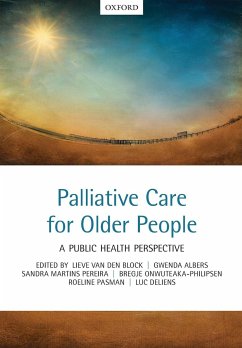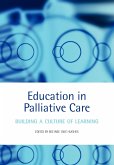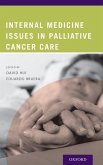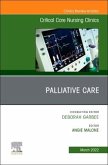Palliative Care for Older People
A Public Health Perspective
Herausgeber: Block, Lieve van den; Martins Pereira, Sandra; Albers, Gwenda
Palliative Care for Older People
A Public Health Perspective
Herausgeber: Block, Lieve van den; Martins Pereira, Sandra; Albers, Gwenda
- Broschiertes Buch
- Merkliste
- Auf die Merkliste
- Bewerten Bewerten
- Teilen
- Produkt teilen
- Produkterinnerung
- Produkterinnerung
Current projections indicate that by 2050 the number of people aged over 80 years old will rise to 395 million and that by this date 25-30% of people over the age of 85 will show some degree of cognitive decline. Palliative care for older people: A public health perspective provides a comprehensive account of the current state of palliative care for older people worldwide and illustrates the range of concomitant issues that, as the global population ages, will ever more acutely shape the decisions of policy-makers and care-givers. The book begins by outlining the range of policies towards…mehr
Andere Kunden interessierten sich auch für
![Education in Palliative Care Education in Palliative Care]() Bee Wee / Nic Hughes (eds.)Education in Palliative Care88,99 €
Bee Wee / Nic Hughes (eds.)Education in Palliative Care88,99 €![Internal Medicine Issues in Palliative Cancer Care Internal Medicine Issues in Palliative Cancer Care]() David HuiInternal Medicine Issues in Palliative Cancer Care65,99 €
David HuiInternal Medicine Issues in Palliative Cancer Care65,99 €![Communication in Palliative Care Communication in Palliative Care]() Janet DunphyCommunication in Palliative Care146,99 €
Janet DunphyCommunication in Palliative Care146,99 €![Palliative Care, an Issue of Critical Care Nursing Clinics of North America Palliative Care, an Issue of Critical Care Nursing Clinics of North America]() Palliative Care, an Issue of Critical Care Nursing Clinics of North America59,99 €
Palliative Care, an Issue of Critical Care Nursing Clinics of North America59,99 €![Triggering and Increasing Palliative Care Consults in the Emergency Room Triggering and Increasing Palliative Care Consults in the Emergency Room]() Caroline TigereTriggering and Increasing Palliative Care Consults in the Emergency Room25,99 €
Caroline TigereTriggering and Increasing Palliative Care Consults in the Emergency Room25,99 €![Music Therapy in Palliative Care Music Therapy in Palliative Care]() Music Therapy in Palliative Care44,99 €
Music Therapy in Palliative Care44,99 €![Using Guided Imagery and Hypnosis in Brief Therapy and Palliative Care Using Guided Imagery and Hypnosis in Brief Therapy and Palliative Care]() Rubin BattinoUsing Guided Imagery and Hypnosis in Brief Therapy and Palliative Care37,99 €
Rubin BattinoUsing Guided Imagery and Hypnosis in Brief Therapy and Palliative Care37,99 €-
-
-
Current projections indicate that by 2050 the number of people aged over 80 years old will rise to 395 million and that by this date 25-30% of people over the age of 85 will show some degree of cognitive decline. Palliative care for older people: A public health perspective provides a comprehensive account of the current state of palliative care for older people worldwide and illustrates the range of concomitant issues that, as the global population ages, will ever more acutely shape the decisions of policy-makers and care-givers. The book begins by outlining the range of policies towards palliative care for older people that are found worldwide. It follows this by examining an array of socio-cultural issues and palliative care initiatives, from the care implications of health trajectories of older people to the spiritual requirements of palliative care patients, and from the need to encourage compassion towards end-of-life care within communities to the development of care pathways for older people. Palliative care for older people: A public health perspective is a valuable resource for professionals and academics in a range of healthcare and public health fields to understand the current state of policy work from around the world. The book also highlights the social-cultural considerations that influence the difficult decisions that those involved in palliative care face, not least patients themselves, and offers examples of good practice and recommendations to inspire, support, and direct healthcare policy and decision-making at organisational, regional, national and international levels.
Hinweis: Dieser Artikel kann nur an eine deutsche Lieferadresse ausgeliefert werden.
Hinweis: Dieser Artikel kann nur an eine deutsche Lieferadresse ausgeliefert werden.
Produktdetails
- Produktdetails
- Verlag: OUP Oxford
- Seitenzahl: 336
- Erscheinungstermin: 1. Juli 2015
- Englisch
- Abmessung: 244mm x 170mm x 18mm
- Gewicht: 581g
- ISBN-13: 9780198717614
- ISBN-10: 019871761X
- Artikelnr.: 47870160
- Herstellerkennzeichnung
- Libri GmbH
- Europaallee 1
- 36244 Bad Hersfeld
- gpsr@libri.de
- Verlag: OUP Oxford
- Seitenzahl: 336
- Erscheinungstermin: 1. Juli 2015
- Englisch
- Abmessung: 244mm x 170mm x 18mm
- Gewicht: 581g
- ISBN-13: 9780198717614
- ISBN-10: 019871761X
- Artikelnr.: 47870160
- Herstellerkennzeichnung
- Libri GmbH
- Europaallee 1
- 36244 Bad Hersfeld
- gpsr@libri.de
Lieve Van den Block, MSc, PhD, is Professor of communication and education in family medicine at the Vrije Universiteit Brussel. She also works as postdoctoral researcher of the Fund for Scientific Research Flanders working in the End-of-Life Care Research Group of the Vrije Universiteit Brussel and Ghent University in Belgium where she chairs the research on palliative care for older people. She holds a Master in Clinical Psychology and a PhD in Medical Social Sciences. She coordinates the EURO SENTI-MELC study, a study occupied with monitoring end-of-life care using sentinel networks of general practitioners in Europe, and is executive coordinator of EU FP7 EURO IMPACT (2010-2014) project, a Marie Curie Initial Training Network on palliative care, and coordinator of EUFP7 PACE on Effectiveness of Palliative Care for Older People (2014-2019). Gwenda Albers MSc, PhD, is postdoctoral research fellow on the EU FP7 EURO-IMPACT project at the Vrije Universiteit Brussels. She has a background in Health Sciences and has been involved in palliative care research since 2008. Her research has been focused on quality of life, dignity, dementia and palliative care for older people. She has been working on several projects (a.o. EU FP7 PRISMA), was a visiting researcher at King's College Cicely Saunders Institute in London and obtained her PhD in 2012 from the VU University Amsterdam. Sandra Martins Pereira, MSc, PhD, is postdoctoral research fellow on the EU FP7 EURO-IMPACT project at the VU University medical center, EMGO Institute for Health and Care Research in Amsterdam, the Netherlands. She obtained her PhD and MSc in Bioethics, and obtained Post-Graduation in Palliative Care, Graduation in Educational Sciences and in Nursing. She is an integrated member of the Office for Research in Bioethics at the Institute of Bioethics, Catholic University of Portugal. Bregje Onwuteaka-Philipsen, PhD, is professor of End-of-life Research at the VU university medical center, EMGO Institute for Health and Care Research in Amsterdam, the Netherlands. She leads the research group 'Public Health at the end of life' of the department of public and occupational health, is program director of research program 'Quality of Care' of the EMGO Institute, and the inter-institutional research program 'Quality of life in cancer and immunology', and board member of Expertise Center for Palliative Care. In 2008 she received a career award of the Netherlands organization of scientific research (NWO, VICI scheme) for the research program 'the patient perspective in end-of-life care: personal dignity, preferences and participation'. She has substantial experience at leading and cooperating in national and international multidisciplinary research programs and has over 200 papers in international peer reviewed journals. Roeline Pasman, MA, PhD, is senior researcher End-of-Life Studies at the VU University medical center, EMGO Institute for Health and Care Research in Amsterdam, the Netherlands. She is trained as a nurse and has a Master in Sociology. She supervises PhD students in their qualitative and quantitative studies on different end-of-life topics (shared decision making, dignity, advance care planning, hospice care). She also participated in the EU FP7 PRISMA project and participates in the EU FP7 EURO-IMPACT project. She participates in the teaching course Qualitative Research for Health Sciences at the Vrije Universiteit Amsterdam. Luc Deliens, PhD, Professor of Public Health and Palliative Care. He is qualified in Medical Sociology, and director of the End-of-Life Care Research Group (a multidisciplinary research team of about 40 researchers with clinical (general practitioners, clinical oncologists, geriatricians, nurses), sociological, psychological and ethical backgrounds) at the Vrije Universiteit Brussel & Ghent University, Belgium. He is Co-Chair of the European Association for Palliative Care Research Network, and Scientific Director of EU FP7 EURO-IMPACT project. He has successfully supervised 27 PhD students and is currently supervising around 20 PhD students, and published over 300 journal articles, and over 50 book chapters.
* PART I Palliative Care for Older People : An introduction
* 1: Gwenda Albers, Sandra Martins Pereira, Bregje
Onwuteaka-Pchilipsen, Luc Deliens, Roeline Pasman, Lieve Van den
Block: A public health perspective to palliative care for older
people: An introduction
* PART II Organization of and policies for palliative care for older
people
* 2: Zeynep Güldem Ökem: Long-term Care Systems
* 3: Katherine Froggatt and Hazel Morbey: Development of palliative
care in long-term care
* 4: Hubertus Vrijhoef and Liesbeth Borgermans: Development of
integrated person-centred care in long-term care
* 5: Richard Harding, Richard A. Powell and Liz Gwyther: Policies on
palliative care for older people in Africa
* 6: Cynthia Goh, Sumytra Menon and Noreen Chan: Policies on palliative
care for older people in Asia
* 7: David Currow and Jane Phillips: Policies on palliative care for
older people in Australia
* 8: Carlos Centeno, José Miguel Carrasco, Kathrin Woitha and Eduardo
Garralda: Policies on palliative care for older people in Europe
* 9: Katherine Ornstein and Diane Meier: Policies on palliative care
for older people in North America
* 10: Liliana De Lima, Lilian Hidalgo, Rocío Morante and Jose Parodi:
Policies on palliative care for older people in Latin America and the
Caribbean
* PART III Socio-cultural and clinical context of dying in old age
* 11: Joachim Cohen and Merryn Gott: Dying in place in old age: public
health challenges
* 12: Symptoms and trajectories experienced by older people approaching
and at the end of life: Implications to care: Symptoms and
trajectories experienced by older people approaching and at the end
of life: Implications to care
* 13: Agnes van der Heide and Kenneth Chambaere: End-of-life decisions
for older patients who are approaching death
* 14: Jennifer Shaw and Margaret Battin: Ethical issues in palliative
care for older people
* 15: Marjolein Gysels: Cultural issues in palliative care for older
people
* 16: Marie-José Gijsberts: Spirituality and spiritual palliative care
in older people
* PART IV Use and access of palliative care for older people
* 17: Thomas Carroll and Timothy Quill: Use of generalist and
specialist palliative care for older people
* 18: Allan Kellehear: Compassionate communities: Caring for older
people towards the end of life
* 19: Ladislav Volicer, Noorhazlina Binte Ali and Joyce Simard:
Palliative care for older people with dementia
* 20: Hazel Morbey and Sheila Payne: Ladislav Volicer, Noorhazlina
Binte Ali and Joyce Simard
* 21: Ruth Piers, Nele Van Den Noortgate and Andre Vyt: Collaboration
between professionals as a necessary condition for palliative care
* 22: Kristian Pollock and Jane Seymour: Communication and advanced
care planning (ACP) in older people
* PART V Innovations in palliative care for older people
* 23: Anne-Sophie Parent: EU civil society initiatives to protect the
right to live and die in dignity
* 24: Clare Gardiner, Tony Ryan, Merryn Gott and Christine Ingleton:
Care pathways for older people in need of palliative care
* 25: A program for advance care planning for older people: Respecting
Patient Choices: A program for advance care planning for older
people: Respecting Patient Choices
* PART V Conclusion: What does a public health approach to improving
palliative care in older people look like?
* 26: Sandra Martins Pereira, Gwenda Albers, Bregje
Onwuteaka-Philipsen, Luc Deliens, Roeline Pasman, Lieve Van den
Block: A public health approach to improving palliative care for
older people
* Index
* 1: Gwenda Albers, Sandra Martins Pereira, Bregje
Onwuteaka-Pchilipsen, Luc Deliens, Roeline Pasman, Lieve Van den
Block: A public health perspective to palliative care for older
people: An introduction
* PART II Organization of and policies for palliative care for older
people
* 2: Zeynep Güldem Ökem: Long-term Care Systems
* 3: Katherine Froggatt and Hazel Morbey: Development of palliative
care in long-term care
* 4: Hubertus Vrijhoef and Liesbeth Borgermans: Development of
integrated person-centred care in long-term care
* 5: Richard Harding, Richard A. Powell and Liz Gwyther: Policies on
palliative care for older people in Africa
* 6: Cynthia Goh, Sumytra Menon and Noreen Chan: Policies on palliative
care for older people in Asia
* 7: David Currow and Jane Phillips: Policies on palliative care for
older people in Australia
* 8: Carlos Centeno, José Miguel Carrasco, Kathrin Woitha and Eduardo
Garralda: Policies on palliative care for older people in Europe
* 9: Katherine Ornstein and Diane Meier: Policies on palliative care
for older people in North America
* 10: Liliana De Lima, Lilian Hidalgo, Rocío Morante and Jose Parodi:
Policies on palliative care for older people in Latin America and the
Caribbean
* PART III Socio-cultural and clinical context of dying in old age
* 11: Joachim Cohen and Merryn Gott: Dying in place in old age: public
health challenges
* 12: Symptoms and trajectories experienced by older people approaching
and at the end of life: Implications to care: Symptoms and
trajectories experienced by older people approaching and at the end
of life: Implications to care
* 13: Agnes van der Heide and Kenneth Chambaere: End-of-life decisions
for older patients who are approaching death
* 14: Jennifer Shaw and Margaret Battin: Ethical issues in palliative
care for older people
* 15: Marjolein Gysels: Cultural issues in palliative care for older
people
* 16: Marie-José Gijsberts: Spirituality and spiritual palliative care
in older people
* PART IV Use and access of palliative care for older people
* 17: Thomas Carroll and Timothy Quill: Use of generalist and
specialist palliative care for older people
* 18: Allan Kellehear: Compassionate communities: Caring for older
people towards the end of life
* 19: Ladislav Volicer, Noorhazlina Binte Ali and Joyce Simard:
Palliative care for older people with dementia
* 20: Hazel Morbey and Sheila Payne: Ladislav Volicer, Noorhazlina
Binte Ali and Joyce Simard
* 21: Ruth Piers, Nele Van Den Noortgate and Andre Vyt: Collaboration
between professionals as a necessary condition for palliative care
* 22: Kristian Pollock and Jane Seymour: Communication and advanced
care planning (ACP) in older people
* PART V Innovations in palliative care for older people
* 23: Anne-Sophie Parent: EU civil society initiatives to protect the
right to live and die in dignity
* 24: Clare Gardiner, Tony Ryan, Merryn Gott and Christine Ingleton:
Care pathways for older people in need of palliative care
* 25: A program for advance care planning for older people: Respecting
Patient Choices: A program for advance care planning for older
people: Respecting Patient Choices
* PART V Conclusion: What does a public health approach to improving
palliative care in older people look like?
* 26: Sandra Martins Pereira, Gwenda Albers, Bregje
Onwuteaka-Philipsen, Luc Deliens, Roeline Pasman, Lieve Van den
Block: A public health approach to improving palliative care for
older people
* Index
* PART I Palliative Care for Older People : An introduction
* 1: Gwenda Albers, Sandra Martins Pereira, Bregje
Onwuteaka-Pchilipsen, Luc Deliens, Roeline Pasman, Lieve Van den
Block: A public health perspective to palliative care for older
people: An introduction
* PART II Organization of and policies for palliative care for older
people
* 2: Zeynep Güldem Ökem: Long-term Care Systems
* 3: Katherine Froggatt and Hazel Morbey: Development of palliative
care in long-term care
* 4: Hubertus Vrijhoef and Liesbeth Borgermans: Development of
integrated person-centred care in long-term care
* 5: Richard Harding, Richard A. Powell and Liz Gwyther: Policies on
palliative care for older people in Africa
* 6: Cynthia Goh, Sumytra Menon and Noreen Chan: Policies on palliative
care for older people in Asia
* 7: David Currow and Jane Phillips: Policies on palliative care for
older people in Australia
* 8: Carlos Centeno, José Miguel Carrasco, Kathrin Woitha and Eduardo
Garralda: Policies on palliative care for older people in Europe
* 9: Katherine Ornstein and Diane Meier: Policies on palliative care
for older people in North America
* 10: Liliana De Lima, Lilian Hidalgo, Rocío Morante and Jose Parodi:
Policies on palliative care for older people in Latin America and the
Caribbean
* PART III Socio-cultural and clinical context of dying in old age
* 11: Joachim Cohen and Merryn Gott: Dying in place in old age: public
health challenges
* 12: Symptoms and trajectories experienced by older people approaching
and at the end of life: Implications to care: Symptoms and
trajectories experienced by older people approaching and at the end
of life: Implications to care
* 13: Agnes van der Heide and Kenneth Chambaere: End-of-life decisions
for older patients who are approaching death
* 14: Jennifer Shaw and Margaret Battin: Ethical issues in palliative
care for older people
* 15: Marjolein Gysels: Cultural issues in palliative care for older
people
* 16: Marie-José Gijsberts: Spirituality and spiritual palliative care
in older people
* PART IV Use and access of palliative care for older people
* 17: Thomas Carroll and Timothy Quill: Use of generalist and
specialist palliative care for older people
* 18: Allan Kellehear: Compassionate communities: Caring for older
people towards the end of life
* 19: Ladislav Volicer, Noorhazlina Binte Ali and Joyce Simard:
Palliative care for older people with dementia
* 20: Hazel Morbey and Sheila Payne: Ladislav Volicer, Noorhazlina
Binte Ali and Joyce Simard
* 21: Ruth Piers, Nele Van Den Noortgate and Andre Vyt: Collaboration
between professionals as a necessary condition for palliative care
* 22: Kristian Pollock and Jane Seymour: Communication and advanced
care planning (ACP) in older people
* PART V Innovations in palliative care for older people
* 23: Anne-Sophie Parent: EU civil society initiatives to protect the
right to live and die in dignity
* 24: Clare Gardiner, Tony Ryan, Merryn Gott and Christine Ingleton:
Care pathways for older people in need of palliative care
* 25: A program for advance care planning for older people: Respecting
Patient Choices: A program for advance care planning for older
people: Respecting Patient Choices
* PART V Conclusion: What does a public health approach to improving
palliative care in older people look like?
* 26: Sandra Martins Pereira, Gwenda Albers, Bregje
Onwuteaka-Philipsen, Luc Deliens, Roeline Pasman, Lieve Van den
Block: A public health approach to improving palliative care for
older people
* Index
* 1: Gwenda Albers, Sandra Martins Pereira, Bregje
Onwuteaka-Pchilipsen, Luc Deliens, Roeline Pasman, Lieve Van den
Block: A public health perspective to palliative care for older
people: An introduction
* PART II Organization of and policies for palliative care for older
people
* 2: Zeynep Güldem Ökem: Long-term Care Systems
* 3: Katherine Froggatt and Hazel Morbey: Development of palliative
care in long-term care
* 4: Hubertus Vrijhoef and Liesbeth Borgermans: Development of
integrated person-centred care in long-term care
* 5: Richard Harding, Richard A. Powell and Liz Gwyther: Policies on
palliative care for older people in Africa
* 6: Cynthia Goh, Sumytra Menon and Noreen Chan: Policies on palliative
care for older people in Asia
* 7: David Currow and Jane Phillips: Policies on palliative care for
older people in Australia
* 8: Carlos Centeno, José Miguel Carrasco, Kathrin Woitha and Eduardo
Garralda: Policies on palliative care for older people in Europe
* 9: Katherine Ornstein and Diane Meier: Policies on palliative care
for older people in North America
* 10: Liliana De Lima, Lilian Hidalgo, Rocío Morante and Jose Parodi:
Policies on palliative care for older people in Latin America and the
Caribbean
* PART III Socio-cultural and clinical context of dying in old age
* 11: Joachim Cohen and Merryn Gott: Dying in place in old age: public
health challenges
* 12: Symptoms and trajectories experienced by older people approaching
and at the end of life: Implications to care: Symptoms and
trajectories experienced by older people approaching and at the end
of life: Implications to care
* 13: Agnes van der Heide and Kenneth Chambaere: End-of-life decisions
for older patients who are approaching death
* 14: Jennifer Shaw and Margaret Battin: Ethical issues in palliative
care for older people
* 15: Marjolein Gysels: Cultural issues in palliative care for older
people
* 16: Marie-José Gijsberts: Spirituality and spiritual palliative care
in older people
* PART IV Use and access of palliative care for older people
* 17: Thomas Carroll and Timothy Quill: Use of generalist and
specialist palliative care for older people
* 18: Allan Kellehear: Compassionate communities: Caring for older
people towards the end of life
* 19: Ladislav Volicer, Noorhazlina Binte Ali and Joyce Simard:
Palliative care for older people with dementia
* 20: Hazel Morbey and Sheila Payne: Ladislav Volicer, Noorhazlina
Binte Ali and Joyce Simard
* 21: Ruth Piers, Nele Van Den Noortgate and Andre Vyt: Collaboration
between professionals as a necessary condition for palliative care
* 22: Kristian Pollock and Jane Seymour: Communication and advanced
care planning (ACP) in older people
* PART V Innovations in palliative care for older people
* 23: Anne-Sophie Parent: EU civil society initiatives to protect the
right to live and die in dignity
* 24: Clare Gardiner, Tony Ryan, Merryn Gott and Christine Ingleton:
Care pathways for older people in need of palliative care
* 25: A program for advance care planning for older people: Respecting
Patient Choices: A program for advance care planning for older
people: Respecting Patient Choices
* PART V Conclusion: What does a public health approach to improving
palliative care in older people look like?
* 26: Sandra Martins Pereira, Gwenda Albers, Bregje
Onwuteaka-Philipsen, Luc Deliens, Roeline Pasman, Lieve Van den
Block: A public health approach to improving palliative care for
older people
* Index








